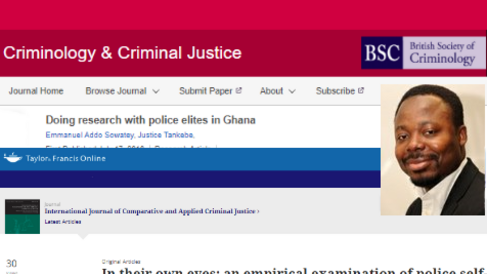
Dr Justice Tankebe published two papers focusing on his research on policing and legitimacy: In their own eyes: an empirical examination of police self-legitimacy in the International Journal of Comparative and Applied Criminal Justice and Doing research with police elites in Ghana in Criminology & Criminal Justice. The latter was co-authored by Emmanuel Addo Sowatey, University of Ghana. Below are the abstracts and links to each paper.
In their own eyes: an empirical examination of police self-legitimacy
ABSTRACT
In their paper Beyond Procedural Justice, Bottoms and Tankebe specified two interrelated dimensions of legitimacy: audience legitimacy and self-legitimacy. Criminologists have given considerable attention to audience legitimacy, but police officers’ belief in their own legitimacy remains understudied. This paper extends Bottoms and Tankebe’s theory and reports findings on some of its key propositions, using survey data from a UK police force. Three key findings emerge. First, contrary to previous studies, feelings of recognition by supervisors and clientele did not predict self-legitimacy; self-legitimacy was found to depend on feelings of peer recognition and acceptance. Second, self-legitimacy predicted officers’ commitment to external procedural justice but not their moral orientations towards crime victims. Finally, perceived police effectiveness but not supervisor recognition – that is, internal procedural justice – was the key predictor both of external procedural justice and of normative orientations towards crime victims. The implications of these findings are discussed.
Doing research with police elites in Ghana
ABSTRACT
Much of our methodological insights from researching policing in sub-Saharan Africa comes from studies of frontline officers. Consequently, many important methodological questions about research on senior police officers remain unanswered. This article addresses this gap by drawing on insights from interviewing senior officers in Ghana. It focuses on the challenges and opportunities in negotiating access, establishing trust during interviews and dealing with ethical dilemmas. We highlight the role of informal social networks and cultural practices of surprise visits, what we have termed strategic ambush, in securing formal approval for our research. However, this represented mere or putative access for which deference towards institutional gatekeepers was key to its actualization. Deference towards officers and extensive knowledge of the policing environment helped to put the senior officers at ease, and enhanced the chances of a successful interview. Finally, we offer reflections on our responses to unexpected ethical dilemmas that we faced in the field.
